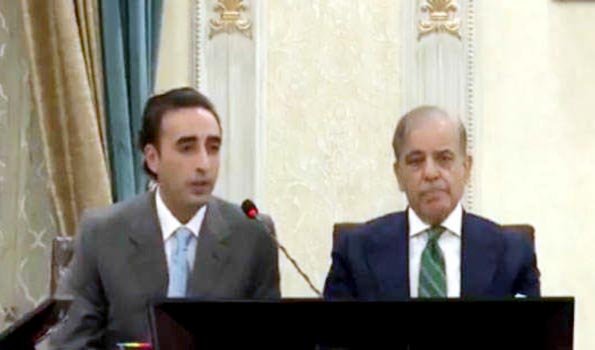Islamabad, Apr 25 (UNI) Following India’s suspension of the Indus Waters Treaty — after the Pahalgam terror attack — that could affect the flow of Indus waters in Sindh province, the Pakistan government has halted its controversial canal project in Sindh.
The announcement was made by Prime Minister Shehbaz Sharif and Pakistan People’s Party (PPP) Chairman Bilawal Bhutto Zardari after a meeting between the ruling Pakistan Muslim League-Nawaz (PML-N) and the PPP delegations at the Prime Minister House, reports Express Tribune.
The decision has ended several days of ongoing political tussle between the two political allies, which had earlier heated up to the point of hostility.
At a joint press conference, Shehbaz Sharif announced that no canals would be constructed unless there is consensus in the Council of Common Interests (CCI). He confirmed that the next CCI meeting on May 2 would formally endorse the agreement reached with the PPP.
The breakthrough followed growing tensions between the PPP and PML-N, with the PPP accusing the federal government of undermining Sindh’s water rights through unilateral canal development.
Bilawal Bhutto, joined by Sindh Chief Minister Murad Ali Shah, thanked the Prime Minister for accepting the PPP’s demands and reaffirmed that no project would proceed without provincial consensus.
CM Shah called the agreement a “major victory”, saying the PPP had consistently maintained the project went against Sindh’s interests. He expressed confidence that the project would be formally scrapped.
The controversial plan to divert six new canals from the Indus River first gained national attention earlier this year when Punjab Chief Minister Maryam Nawaz launched the Green Pakistan Initiative in Cholistan, sparking fears of water scarcity in Sindh.
In March, the Sindh Assembly unanimously passed a resolution opposing the project, while nationalist parties, including the Grand Democratic Alliance, mobilised mass rallies in Karachi, Sukkur, Nawabshah, and Daharki.
Critics warn that diverting water from the Indus could devastate Sindh’s economy, dry up fertile lands, and destroy the Indus Delta’s fragile ecosystem. With 72% of Sindh’s population relying on groundwater, the stakes are very high.
The Indus Delta has lost 92% of its freshwater, endangering mangroves and fisheries vital to Pakistan’s environment.
The Sindh protest against canals has united farmers, students, lawyers, and even political heavyweights like the Pakistan People’s Party (PPP). Since November 2024, rallies, sit-ins, and highway blockades have swept the province.
The protesters have emphasised that the people of Sindh had overwhelmingly rejected the six canal scheme, which they see as an attack on Sindh’s riparian rights. Activists noted that water scarcity had forced residents of tail-end areas to buy water at exorbitant prices, putting human life and the survival of aquatic creatures at stake in Sindh’s coastal areas.
The protesters, including lawyers, nationalist groups, civil society, and political leaders continue to hold sit-ins and strikes across multiple districts, demanding the project’s formal cancellation be intimated through a binding notification.











